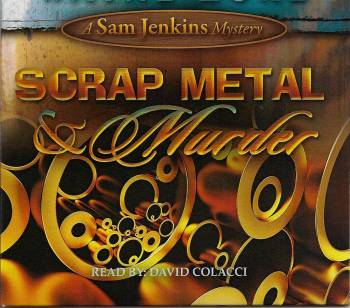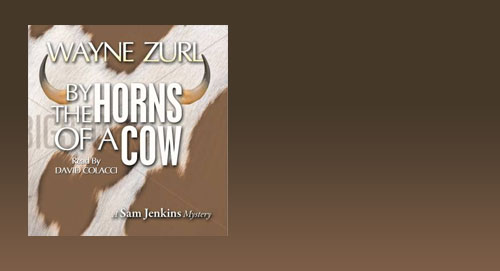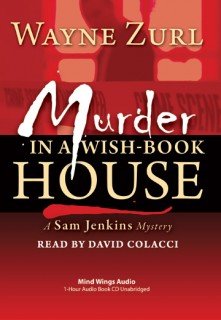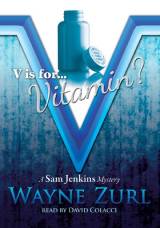Scrap Metal and Murder

 Chief Sam Jenkins investigates theft of copper wire and pipe from local construction sites and makes a quick arrest.
Chief Sam Jenkins investigates theft of copper wire and pipe from local construction sites and makes a quick arrest.
Shortly after the thief is released on bail, Sam finds his complainant murdered and dropped into the basement of a home under construction.
The homicide investigation turns up more suspects than Jenkins ever wanted to meet. A rival builder under indictment, his beautiful wife, the victim’s wife and her lover, and the copper thief lead the parade.
In a Rex Stout/Nero Wolfe-style ending, Sam assembles the players and exposes the killer.
Available as an audio book compact disc from the publisher at www.mindwingsaudio.com
MP3 digital downloads are currently sold by www.booksonboard.com. In the future www.audible.com will assume this role.
Purchase books and eBooks from:
Read An Excerpt
Large clumps of Dallis grass dotted the gravel parking lot, and a bumper crop of ragweed grew along the exterior walls of the bar.
A half dozen vehicles, four of them pickup trucks, were scattered around the lot in no particular order. I parked near the door and walked in.
The smell of stale beer and old cigarette smoke could have gagged a maggot.
The occupants of those six parked vehicles perched on stools and lounged at tables throughout the dingy gin mill.
A not quite pretty blond in a short black dress sang her rendition of It Takes Balls to be a Woman. Her guitarist wore a fancy two-tone cowboy shirt and looked vaguely like Stephen King, if Steve hadn’t washed his hair in a decade.
I took a stool at the close end of the bar.
“What’ll ya have?” the bartender asked as he dropped a stained coaster in front of me.
I placed him somewhere between forty and sixty, broad and short with a crew cut and a walrus mustache. From the twists of his nose, you could count the number of times it had been broken. His teeth were stained yellow as were two fingers of his right hand. He might have single-handedly accounted for the nicotine stink inside the Bucket O’ Blood.
“What do you have on tap?” I asked.
“Bud.”
“That’s it?” I gave him a friendly smile.
“Uh-huh.” He didn’t return the smile.
“How about in a bottle?”
“Bud Light . . . an’ more Bud.”
“A company man, huh?” I managed another smile.
“Do what?” Still the same blank expression from him.
So far a tip was out of the question.
“I’ll have a pint of Bud.”
“Don’t got no pints.”
“Okay, make it easy on yourself.” I grew tired of our erudite debate.
He took three steps to the tap handle and came back with a twelve ounce mug.
The beer was cold and fresh. The bartender went to check on his other customers and I looked over the room. It probably wasn’t the worst place I’d ever seen, but it made my bottom ten.
As the blond ended her song, the barman walked back toward me drying a glass.
“Are you Ned,” I asked.
“Nope, I’m Jake. Ned won’t be here till mebbe eight-thirty, nine o’clock.”
“Got a few minutes to talk?”
“Ain’t exactly got a crowd takin’ up my time,” he said.
“I need some information.”
My statement caused a wrinkle on his brow and a general look of distrust to alter his expression.
“You the po-leece or sumpthin’?”
“Or something,” I said, and showed him my badge. “You know a guy named Melvin Kite? I understand he comes here.”
“Melvin Kite? Hmm, not sure.”
Jake’s momma taught him how to play hard-to-get.
“How much was that beer?” I asked.
“Two-fifty.”
I took a twenty from the folded wad of cash in my pocket and placed it on the bar.
I grinned and said, “I guess you could keep the change . . . if you knew something about this Melvin Kite guy.”
Jake liked that idea; finally his turn to smile.
“Melvin Kite? Melvin Kite? he said. “Sounds familiar now. He a short, stocky guy with a scar on his chin?”
“Sounds like my man, but the picture of him I saw was almost five-years-old.”
“I know him,” Jake said. “What’s he done?”
“I’m not sure he’s done anything,” I lied. “Someone reported a hit-and-run and gave his plate number. I need to find him and straighten that business out.”
“Why don’t you go to his home?”
Jake was a practical thinker.
“All the addresses I can find are old. Melvin moves around a lot.”
“Comes in here some,” Jake said, “exspecially when they’s live music. I ‘spect he’ll be here tonight t’ see Marla.”
He used his chin as a pointer and gestured toward the stage where the blond flipped through the pages of a spiral notebook and Steven King tuned his guitar.
“You’ve been a big help, Jake,” I said.
He took hold of the twenty with his thumb and forefinger. I grabbed the opposite end and tugged. I won.
“I done thought you said . . .” Jake looked surprised and disappointed.
I tore the twenty in half, gave one part to Jake, and filed the second half in my top pocket.
“Give me a wink, Jake, old buddy, when Mr. Kite shows up. Then the other half’s yours, okay?”
Jake nodded. He liked that idea, too.
I looked at my watch; 7:30. I had some waiting to do. I picked up Jake’s copy of the News-Sentinel and took that and my beer to a table in the far corner of the room. There wasn’t much light to read by, so I looked at the pictures.
Marla and Steve started playing again; something with a Nashville sound. I heard lyrics about a cheatin’ man, a pickup, and possibly a ratchet wrench – but I’m terrible at music comprehension.
At 8 PM a stocky, blue-collar guy dressed in the ubiquitous outfit of the Smokies walked into Ned’s. Washed-off blue jeans rode low on his wide hips. A faded orange UT jersey hung outside his pants, and a dirty Atlanta Braves ball cap sat on his head.
He bellied up to the bar and grabbed the mug of Bud Jake had ready for him. After taking a sip, he did a right face and stepped over to an unoccupied table.
I looked at Jake. He put a finger up to his nose and nodded. My twenty dollar signal. He must have learned that gesture from Paul Newman in The Sting.
I folded the paper, picked up my mug, and headed toward the bar. I dropped my half of the twenty on the counter, winked at Jake and touched my nose. Robert Redford all the way.
After waiting thirty seconds for Marla to finish her song, I took a short walk to Melvin’s table and sat down.
He swiveled his head and gave me a surprised look.
“Hi,” I said, “I’ll bet you’re Melvin Kite.”
“Do what?” was the best he came up with.
“My name’s Jenkins, but you can call me chief – as in police chief – from beautiful downtown Prospect, Tennessee.”
“I ain’t done nuthin’” he said, shifting in his chair to look at me square on.
The dark hair sticking out from under his cap needed a trim, and his five o’clock shadow looked several hours old.
“Sure you have, Melvin,” I said. “Let’s start out on the right foot. I won’t bullshit you so don’t bullshit me. Okay?”
“What the hell ya talkin’ about?”
“Copper, Melvin, I’m talking about copper.”
“Oh,” he said, and his shoulders dropped three inches.
“Where’d you get all the copper you’ve been selling at Knoxville Scrap Metal and Salvage?”
“I ain’t sold much there, not but a few pounds.”
“Goddamnit, Melvin, now you’ve gone and pissed me off. I thought we had a no bullshit treaty.”
He frowned at that.
“If we weren’t in a public place,” I said, “I’d have taken offense to that lie and smacked you upside the head with this mug of beer. Wanna try answering that question again?”
“Whatcha wanna know?” he asked.
“The salvage yard has records of you bringing in hundreds of pounds of copper. Where’d you get it?”
“I guess ya done already figgered that out.”
“Yeah, ya think?”
Marla started another tune and Steve closed his eyes as he strummed his guitar.
“Now why don’t we listen to the young lady sing about her shithead boyfriend, finish our beers, then take a ride to my office and talk about your midnight scrap metal business?
The parking spots next to the PD back door allow us to walk suspects and prisoners inside without giving them much chance to escape. I used one when Melvin Kite and I pulled in behind the municipal building.
We bypassed the squad room and I led Melvin directly to my office. We sat in the guest chairs in front of my desk and faced each other. I didn’t offer to make coffee.
“Okay, Melvin,” I said, “let’s talk copper.”







 When a fourteen foot tall statue of a dairy cow is stolen from a market in Prospect, Tennessee, Chief Sam Jenkins wonders: Cattle rustlers or ancient Greeks looking for a substitute for their aging Trojan horse?
When a fourteen foot tall statue of a dairy cow is stolen from a market in Prospect, Tennessee, Chief Sam Jenkins wonders: Cattle rustlers or ancient Greeks looking for a substitute for their aging Trojan horse?
 One of the strangest investigations ever!
One of the strangest investigations ever!
 Chief Sam Jenkins investigates the murder of a Blount County, Tennessee school teacher. All the facts point to a simple conclusion, the man’s wife, an escaped mental patient, killed her husband to gain custody of their small daughter. With the help of his usual cadre of friends and co-workers, Sam devises a plan to lure the obsessed woman into a trap when she tries to kidnap the child from the foster parents caring for the girl. The surprise outcome even disturbs Jenkins.
Chief Sam Jenkins investigates the murder of a Blount County, Tennessee school teacher. All the facts point to a simple conclusion, the man’s wife, an escaped mental patient, killed her husband to gain custody of their small daughter. With the help of his usual cadre of friends and co-workers, Sam devises a plan to lure the obsessed woman into a trap when she tries to kidnap the child from the foster parents caring for the girl. The surprise outcome even disturbs Jenkins.
 What starts out as a slam-dunk arrest of two subjects for a series of armed robberies on the greenway at Prospect, Tennessee turns into a murder investigation at a local nursing home.
What starts out as a slam-dunk arrest of two subjects for a series of armed robberies on the greenway at Prospect, Tennessee turns into a murder investigation at a local nursing home.



